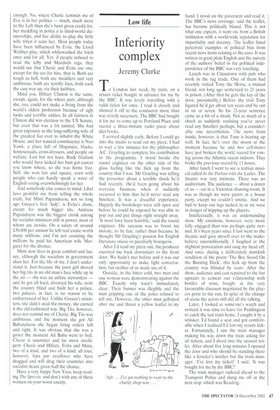Inferiority complex
Jeremy Clarke To London last week, by train, on a return ticket bought in advance for me by the BBC. It was lovely travelling with a valid ticket for once. I read it closely and showed it off to the conductor more than was strictly necessary. The BBC had bought it for me to come up to Portland Place and record a three-minute radio piece about diet books.
I arrived slightly early. Before I could go into the studio to read out my piece, I had to wait a few minutes for the philosopher A.C. Grayling to complete his contribution to the programme. I stood beside the sound engineer on the other side of the glass feeling like the hick up from the country that I was. Mr Grayling was telling the presenter about a terrible shock he'd had recently. He'd been going about his everyday business, when it suddenly occurred to him that he'd never read any Smollett. It was a dreadful experience. Happily the bookshops were still open and before he could be exposed he was able to pop out and put things right straight away. 'It must have been horrible.' said the sound engineer. His sarcasm was to boost my morale, to be fair, rather than because he thought Mr Grayling's passion for English literature otiose or peculiarly bourgeois.
After I'd read my piece out, the producer escorted me back downstairs to the front door. We hadn't met before and it was our only opportunity to make light conversation, but neither of us made use of it.
Outside, in the bitter cold, two men and one woman were demonstrating against the BBC. Exactly why wasn't immediately clear. Their banner was illegible and the man gripping one of the poles refused to tell me. However, the other man galloped after me and thrust a yellow leaflet in my hand. I stood on the pavement and read it. The BBC's news coverage, said the leaflet, has become politically biased. This is not what one expects, it went on, from a British institution with a world-wide reputation for impartiality and decency. The leaflet listed perceived examples of political bias from recent news items relating to the euro. It was written in good plain English and the naivety of the authors' belief in the political independence of the BBC was very touching.
Lunch was in Chinatown with pals who work in the rag trade. One of them had recently visited Tony the Horse, a mutual friend, not long ago sentenced to 21 years in prison. (After that he gets the key of the door, presumably.) Before the trial Tony figured he'd get about ten years and be out in six or seven. So his 21-year sentence came as a bit of a shock. Not as much of a shock as suddenly realising you've never read any Smollett perhaps, but a considerable one nevertheless. The news from inside, however, is that Tone is bearing up well. In fact, he's over the moon at the moment because he and two cell-mates have just broken the world record for rowing across the Atlantic ocean indoors. They broke the previous record by 11 hours.
After lunch I went to see a lesbian musical called In the Parlour with the Ladies. The theatre was very intimate. There was no auditorium. The audience — about a dozen of us — sat in a Victorian drawing-room. It was as though we were guests at a house party, except we couldn't smoke. And we had to keep our legs tucked in or we were in danger of tripping up the players.
Intellectually, it was an undemanding show. My emotions, however, were more fully engaged than was perhaps quite normal. It's been years since I last went to the theatre and gave myself over to the makebelieve unconditionally. I laughed at the slightest provocation and sang my head off. And once, during a deliberately mawkish rendition of the poem 'The Boy Stood On the Burning Deck', this hick up from the country was blinded by tears. After the show, audience and cast repaired to the bar upstairs to cement our relationship with bottles of wine, bought at the very favourable discount negotiated by the players prior to the run. In spite of the change of scene the actors still did all the talking.
Later. I looked at someone's watch and noticed it was time to leave for Paddington to catch the last train home. I caught it by a whisker. I'd found a seat and got comfortable when I realised I'd lost my return ticket. Fortunately, I saw the train manager making his way down the train asking for all tickets, and I dived into the nearest toilet. After about five long minutes I opened the door and who should be standing there like a ferreter's lurcher but the train manager. 'I've lost my ticket! I said. It was bought for me by the BBC!'
The train manager radioed ahead to the Transport Police and slung me off at the next stop, which was Reading.


























































 Previous page
Previous page